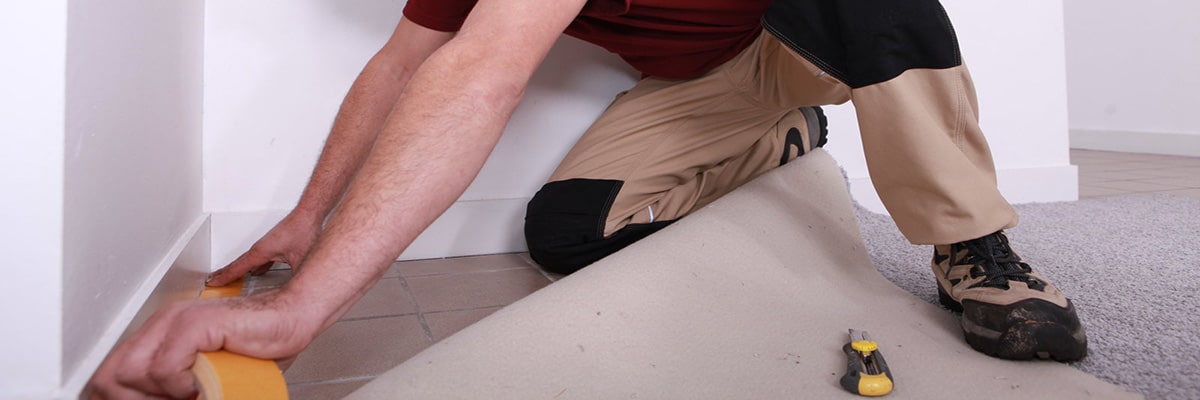
Colorado Workers’ Compensation for Flooring Installers
Learn about your right to benefits if you’ve been injured as a flooring installer
Nestled against the picturesque backdrop of the Rocky Mountains, Denver is a bustling hub of urban charm. Amidst the city’s vibrant culture and landmarks like the iconic Red Rocks Amphitheatre and the Denver Art Museum, flooring installers work diligently to transform homes and businesses into functional and stylish spaces.
With a strong construction market in Denver over the last decade, work in the flooring industry has also been abundant. But these jobs come with serious occupational risks, making injuries all too common among flooring installers.
Fortunately, most employees in Colorado qualify for workers’ compensation benefits after an on-the-job injury. But determining whether or not you’re classified as an employee isn’t always as easy as it seems.
This article will help you understand how Denver classifies an employee vs. independent contractor and how this classification affects your right to collect compensation after an injury.
Injury statistics for flooring installers
It should come as no surprise that some of the most commonly reported injuries among flooring installers are knee injuries since floor installation requires workers to constantly kneel on hard surfaces.
In fact, a typical carpet installation job requires carpet layers to be on their hands and knees approximately 75% of the time. These workers are also frequently required to use a device called a “knee kicker” when installing wall-to-wall carpet to stretch and position it, which places immense stress on their kneecaps.
According to the Centers for Disease Control and Prevention (CDC), carpet installers make up only 0.06% of workers in the U.S., but they file more than 6% of workers’ compensation claims each year for traumatic knee injuries.
This rate is 108 times that of total workforce claims, making it the highest-rated occupation for knee injuries in the U.S. Tilesetters come in second, at 53 times the expected knee injury rate, compared to workers in other industries.
Common job duties of flooring installers
Installing flooring tiles or carpeting may seem like a relatively simple process to the casual observer, but there’s a great deal of preparation and detail that goes into doing the job correctly. Common job duties of flooring installers include the following:
- Preparing work areas. Flooring installers must first inspect and prepare the work area by removing existing flooring materials, ensuring the surface is clean and level, and making any necessary repairs.
- Measuring and cutting materials. Next, they take precise measurements of the area to be covered and cut flooring materials, such as carpets, tiles, hardwood or vinyl, to fit the space accurately.
- Installing flooring. Flooring installers then lay and secure the flooring materials according to the manufacturer’s instructions and industry standards. This may involve using adhesives, nails, staples or other fastening methods.
- Finishing and detailing. After installation, final detail work is done to ensure that the edges, corners and seams are properly finished and that any necessary transitions between different types of flooring are seamless. Stain or sealant may also be applied.
Common injuries for floor installers
Due to the nature of floor installation, certain types of occupational hazards and injuries are more prevalent, including:
- Knee injuries. As previously mentioned, knee injuries are common and can include bursitis, patellar tendonitis, meniscus tears, osteoarthritis, as well as strains and sprains in the knee muscles and ligaments.
- Back and neck injuries. These types of injuries often occur as a result of slip-and-fall accidents or heavy lifting (especially when proper lifting techniques aren’t implemented).
- Illness from exposure to toxic chemicals. A recent study found that approximately 80% of the wood finishes used in flooring contain volatile organic compounds (VOCs) and toxic chemicals. Toxic adhesives are also used to bond wood and laminate flooring. Exposure to these substances can cause kidney damage, asthma, cancer, and other serious medical conditions.
- Repetitive stress injuries. Because of the tools and repetitive motions required to install flooring, these workers are at risk for repetitive motion injuries like carpal tunnel syndrome.
- Hand injuries and amputations. Injuries to the hands while working with floor installation tools are common and can result in permanent, debilitating damage, including the loss of a finger or hand. Saws, hammers, drills, etc., can be extremely dangerous, especially if workers are inexperienced or haven’t been properly trained in their use.
To help prevent these types of injuries, it’s imperative that project managers and supervisors ensure that employees are properly trained and provided with all necessary personal protective equipment (PPE) while on the job.
Workplace Injuries and Pre-Existing Conditions
Learn if a pre-existing medical condition could affect your ability to get workers’ comp benefits in Colorado.
Eligibility requirements for workers’ compensation in Colorado
In Colorado, most employers with even 1 employee are required to purchase workers’ compensation insurance to provide benefits to workers in the event of a work-related injury or illness.
However, there are certain exceptions, including:
- Part-time domestic workers
- Licensed real estate agents and brokers who work on commission
- Casual maintenance workers who earn less than $2,000 annually
- Federal and railroad employees covered under federal laws
- Corporate officers and LLC members
- Independent contractors
Workers’ comp is a no-fault system, so workers don’t have to prove their employers were negligent to get compensation. For eligible employees to qualify for benefits, they only need to be able to prove that their injuries or illnesses were the direct result of their job duties or work environments.
Please note that injuries from one-time accidents as well as illnesses like asthma or lung cancer caused by long-term exposure to work hazards qualify for benefits under Colorado law.

Chronic Pain at Work
Find out how Colorado workers’ compensation can help you manage the financial effects of chronic pain.
How does Colorado define an independent contractor?
In Colorado, an individual is defined as an independent contractor if they are shown to be free from control and direction while performing their services, both under contract and in fact.
This means that if you have control over which jobs you do and how you go about doing them, you may be considered an independent contractor.
There is a 3-factor test to determine if a person is an independent contractor under Colorado law:
- Behavioral test questions include:
- Do you report to a manager?
- Do you receive training for your job?
- Do you work whenever and wherever you want, or do you follow a fixed schedule?
- Do you follow the company’s rules and requirements?
- Do you receive work evaluations?
- Financial test questions include:
- How are you paid (weekly, monthly, etc.)?
- Do you have unreimbursed business expenses?
- Do you pay for your own work-related resources (i.e., computers, phone, etc.)?
- To what extent can you realize a profit or loss?
- Do you pay for your own health and liability insurance?
- Relationship test questions include:
- Do you receive benefits like insurance, pension, paid time off, fringe benefits, etc.?
- Do you have a written contract that describes your relationship with the company?
- Do you provide an invoice for completed jobs or projects?
- How permanent is the relationship with the company?
- Are the services you provide a key aspect of the company’s business?
Determining the answers to these questions and, ultimately, your distinction as an employee or independent contractor can be a complicated process, so consider consulting with a workers’ compensation attorney if you’re unsure about your work classification after an injury.
Are independent contractors eligible for workers’ compensation in Colorado?
Under Colorado law, independent contractors are not eligible for workers’ compensation benefits. If, however, you believe you’ve been misclassified as an independent contractor, you should reach out to an experienced work injury attorney who can help determine your eligibility.
Who’s liable if a flooring installer is injured while working as an independent contractor?
As an independent contractor who’s considered self-employed, you’ll need to prove someone else is liable for your injury to receive compensation. Depending on the circumstances of your injury, potentially negligent parties may include:
- The company that employed you
- Other contractors and subcontractors involved in the project
- The owner of the property where the work was done
- Manufacturers of defective tools or products
Types of workers’ comp benefits available to employees
Eligible employees injured on the job in Colorado have a much easier path to compensation since they don’t need to prove fault. For them, workers’ compensation benefits are available that include the following:
- Medical benefits. Workers are entitled to compensation for all medical-related costs while they recover, including hospital bills, medications, surgeries, doctor appointments, rehabilitation and medical supplies.
- Lost wages. If a work-related injury or illness results in missed work, workers’ comp will pay two-thirds of their average weekly wages while they recover.
- Death benefits. If an employee dies as a result of a work-related injury or illness, workers’ comp will provide their dependents with compensation for their funeral expenses and lost income.
Steps to file a workers’ comp claim in Colorado
To collect workers’ compensation benefits in Colorado, take the following steps:
- Seek medical care. This is an important first step in establishing that your injury or illness is work-related.
- Provide your employer with written notice of the incident within 4 days of its occurrence. After they receive notice, they must notify their workers’ compensation insurer of your injury within 10 days.
- Wait to hear if your claim is approved or denied. The workers’ comp insurer has up to 20 days to make a decision.
- Contact an attorney for help with an appeal if your claim is denied.
Why Was Your Colorado Workers’ Compensation Claim Denied?
Learn 7 common reasons why your workers’ compensation claim might be denied in Colorado.
How can an attorney help if an injured worker believes they’re misclassified as an independent contractor?
An attorney can provide valuable assistance to a worker who believes they were misclassified as an independent contractor. They can review the worker’s employment status, contracts, and job responsibilities to determine if misclassification has occurred.
If misclassification is confirmed, the attorney can help the worker take legal action to seek reclassification as an employee. This can involve filing a wage claim, pursuing a lawsuit, or seeking remedies under labor laws to ensure the worker receives the appropriate benefits, protections and compensation to which they’re entitled.
Were you injured working as a flooring installer? Contact an experienced Colorado work injury attorney for help.
If you’ve been injured at work in Denver, let the experienced workers’ compensation attorneys at The Babcock Law Firm help you with your claim. We can give you an estimate of how much your injury should be worth and negotiate with your employer and their insurance company to ensure you get the compensation you deserve.
Contact us today for your free consultation to learn more about how we can help.



